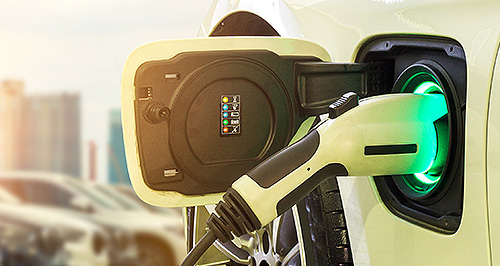Make / Model Search
News - Industry NewsIndustry slams ‘luxury fossil fuel car tax’ planNo mistake: The FCAI says it is committed to encouraging an uptake of low-emissions vehicles, but considers it ‘madness’ to slap a 17 per cent tax on cars (above a certain threshold) for having an internal combustion engine. FCAI calls Greens’ new tax ‘madness’ as AADA warns 2030 ICE ban will do serious harm29 Mar 2019 By TERRY MARTIN AUTOMOTIVE industry bodies have slammed the Australian Greens’ proposal to introduce a “luxury fossil fuel car tax” on all vehicles with a traditional internal combustion engine costing more than $66,331.
While broadly supporting many of the party’s policy initiatives released this week that will encourage the take-up of electric vehicles and reduce transport emissions, peak industry organisations including the Federal Chamber of Automotive Industries (FCAI) and Australian Automotive Dealer Association (AADA) have roundly criticised the Greens’ plan to pay for its measures with the new 17 per cent tax, which kicks in at the same point as the current contentious luxury car tax.
The AADA has also warned that the Greens’ determination to have all new petrol and diesel cars banned from sale from 2030 “could do serious harm” to new-vehicle retailers and their customers, particularly tradespeople who have specific requirements.
The fossil fuel tax would run for the next four years to help pay for incentives such as scrapping import tariffs, GST, stamp duty and all registration fees on electric vehicles.
If the existing 33 per cent luxury car tax, for which the industry has long called to be scrapped, remains in place, that would see a combined 50 per cent tax hit on regular new combustion-engined vehicles – including models such as utes and vans that many argue are hardly “luxury cars”.
FCAI chief executive Tony Weber called the proposal “madness” and urged the major political parties to adopt a balanced policy approach as the May federal election looms.
If the Australian Labor Party wins office, the Greens’ influence might prove crucial in the formulation of future policies and regulations affecting the car industry.
“Make no mistake, we certainly need a focus on encouraging low-emission vehicles here, but it’s madness to consider a mass ‘luxury’ car tax on ICE (internal combustion engine) vehicles,” Mr Weber said.
The FCAI chief added that ICE vehicle emissions “have been steadily reducing through the introduction of new technology developed and delivered by the automotive industry, and this reduction will continue”.
He also said that the automotive industry “will continue to do the heavy lifting in reducing transport emissions” as demonstrated by the increasing number of full-electric, hybrid and even hydrogen fuel-cell electric vehicles becoming available in Australia.
“While it’s great to see the environmental focus of the Greens, and the fact that they are ticking some strong low-emission friendly boxes, the FCAI supports a considered approach,” he said.
According to the FCAI, this “considered approach” encompasses “pragmatic and achievable” emissions and carbon reduction targets, clear targets to support the uptake of low-emission vehicles (including those with an ICE), adoption of innovative technologies in government fleets, a structured approach to EV infrastructure planning and construction, and a broad range of incentives for low-emission vehicles such as tax and duty relief, lower registration costs and, not least of all, abolition of the luxury car tax.
AADA chief executive David Blackhall said: “We support the Greens intention to reduce transport emissions, but the way to do that is to remove older vehicles from the roads, not increase the price of new vehicles, which are cleaner and more efficient.
“The emissions intensity of new vehicles has reduced by 28 per cent over the past 15 years and this trend will only accelerate as more affordable electric vehicles and hybrids are increasingly sold.
“The industry does not need another luxury tax on vehicles. Car buyers already pay hundreds of millions each year to the federal government for a tax that falls on some of the safest and cleanest vehicles, including many electric vehicles.”
Mr Blackhall also said that the Greens’ proposal to ban all new ICE vehicles by 2030 “could do serious harm to tradespeople and the retail car industry”.
“Australia’s two top-selling vehicles are the Toyota HiLux and the Ford Ranger, both utes which are used to carry heavy loads and tow trailers significant distances,” he said.
“Currently, these vehicles can only perform to these standards with an internal combustion engine and it is uncertain whether an alternative powertrain will be available to satisfy their role in a decade.
“Regulations seeking to reduce vehicle emissions should avoid dramatic price increases and restriction of choice, as this may lead to reduced new-car sales which will hurt industry and result in poor environmental outcomes.
“The focus should be on making greener vehicles more affordable and convenient not making new vehicles more expensive.”  Read more29th of March 2019  Greens propose radical shake-up of auto industryEVs at heart of Greens party plan to reduce, then eliminate combustion-engined cars11th of March 2019  National automotive reforms needed: VACCVACC hands over recommendations, of which automotive industry roadmap is key1st of February 2019  AAA urges user-pays road system, starting with EVsTime for fuel excise to be scrapped as part of major reform to transport system: AAA1st of February 2019  Industry welcomes national EV reportBroad support for EV report but AADA defends dealers and others call for more action1st of February 2019  Senate committee urges action on EV uptakeIncentives, stricter emissions, sales targets could be used to increase EV sales |
Click to shareIndustry News articlesMotor industry news |











Facebook Twitter Instagram